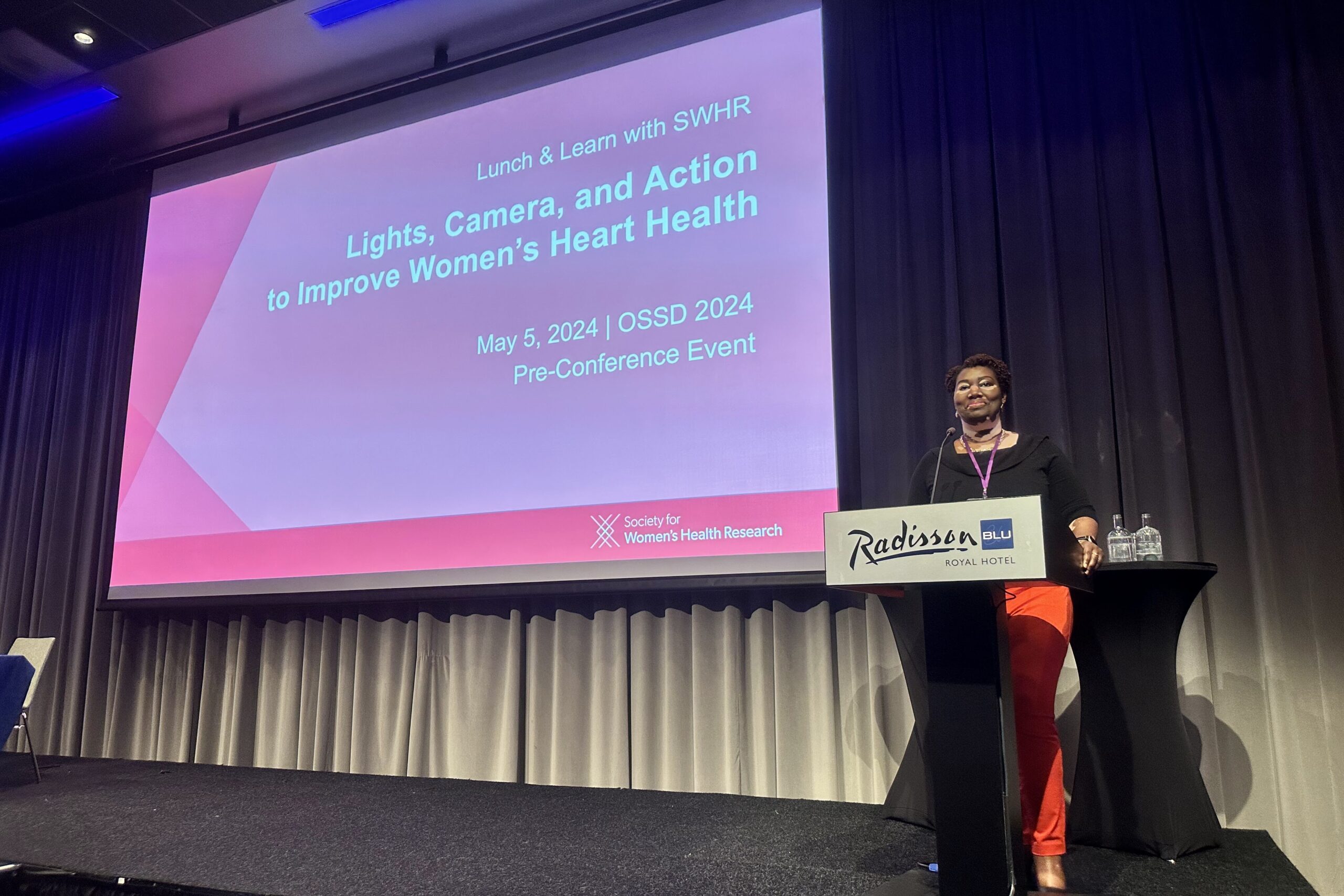SWHR Chief Science Officer Irene O. Aninye, PhD presents at the “Lights, Camera, and Action to Improve Women’s Heart Health” session.
By Syreen Goulmamine, MPH, SWHR Science Programs Manager
Earlier this month, the Society for Women’s Health Research (SWHR) hosted a pre-conference symposium session prior to the Organization for the Study of Sex Differences (OSSD) 2024 Annual Meeting in Bergen, Norway. The symposium, “Beyond Bikini Medicine: A Spotlight on Women’s Health Research,” brought together experts to ask questions about women’s health from mental to cardiovascular health and share the latest findings in their respective fields and research areas.
The symposium’s keynote began with remarks from Dr. Julia Sacher of the Max Planck Institute for Human Brain Sciences, titled “A Focus on Hormonal Transitions Across the Lifespan for Brain Health and Aging Trajectories,” and ended with a presentation by Dr. Birgit Derntl of University of Tübingen, “The Brains of Women: Sex, Drugs, and So Much More.” Throughout the symposium, experts from across the world shared research related to hormonal cycles, pregnancy and postpartum, hormone therapy, menopause and endometriosis, as well as topics such as the need for more education in women’s health in medical school and how basic science can translate to women’s health.
SWHR Chief Science Officer Irene O. Aninye, PhD, and Science Programs Manager Syreen Goulmamine, MPH, were two of the day’s presenters. During “Lights, Camera, and Action to Improve Women’s Heart Health,” Dr. Aninye and Ms. Goulmamine discussed the advances, challenges, and opportunities to address cardiovascular disease (CVD) in women – from the lab to legislation – with insights on implementation.
Dr. Aninye discussed SWHR’s Women’s Health Dashboard, which presents data of disease burden, research investment, knowledge and health care gaps, and policy implications for diseases that differently and disproportionately affect women. Dr. Aninye spoke specifically about the dashboard resources that relate to ischemic heart disease. During her presentation, Dr. Aninye noted that by 2030, the total spending associated with adult cardiovascular disease will amount to $818 billion. Some primary prevention advancements in women’s heart health that could reduce this cost burden include greater recognition of non-traditional risk factors for CVD, comprehensive preventive screening and interventions to reduce risk factors in women, and community-based education and awareness programs. One way that the SWHR has worked to advance cardiovascular research and care for women is by convening experts across disciplines and sectors to survey the scientific landscape and propose research questions, clinical strategies, and policy solutions to address key gaps in the field. Dr. Aninye highlighted SWHR’s Heart Health program, which created informational resources, including a Heart Health Policy Agenda, a Call to Action (Lifespan Approach to Addressing Ischemic Heart Disease in Women), and a fact sheet (Factors Impacting Women’s Cardiovascular Health Across the Lifespan), among other resources. Dr. Aninye’s session also discussed the central role that scientists play in advocacy efforts, providing examples of how their involvement has promoted legislative change in the women’s heart health space in the United States.
Ms. Goulmamine presented on “Intersecting Realities Concerning Heart Health and Intersectionality,” where she highlighted the impact of understanding the many identities of women living with or at risk for heart and the need to adjust research to incorporate these intersections. In her talk, she explored how our diverse identities intersect and influence heart health outcomes, specifically the unique identities that impact women’s heart health, highlighting the need for a tailored approach to address the diverse needs and challenges faced by women. When studying women’s heart health and disease, researchers must consider how women exist within multiple social categories simultaneously and how these intersecting identities can result in unique health challenges and disparities. Ms. Goulmamine stressed how understanding and addressing intersectional experiences in heart health would better allow clinicians and public health programs to tailor heart disease interventions and lead to more effective and equitable health care outcomes. This idea of incorporating intersecting identities into interventions could also apply to various disease areas. Her talk concluded with sharing practical strategies for basic and clinical researchers to incorporate an intersectional approach into their research, empowering them to foster inclusivity and effectiveness in their studies and interventions.
Following these presentations, Dr. Aninye and Ms. Goulmamine led an exercise to engage meeting participants in considering how to incorporate an intersectional lens within basic and/or clinical research study designs through a case study. Attendees had the opportunity to brainstorm with fellow researchers and present their outtakes to the larger group. Attendees were challenged to think outside the box, resisting the assumptions they commonly encounter within their respective fields.
SWHR also hosted an “Emerging Scholars in Women’s Health Research Award Symposium” during the Annual Meeting. The 2024 SWHR Emerging Scholars in Women’s Health Research Award was given to trainees whose abstracts demonstrated research excellence in addressing important knowledge gaps in health and disease areas that disproportionately, differently, or exclusively affect women. This year, the inaugural year for the award, centered on Aging & Women’s Health.
Check out highlights from the SWHR pre-conference symposium and from all of the OSSD 2024 Annual Meeting on social media here.
Learn more about SWHR’s work with the Women’s Health Dashboard here, and about SWHR’s Heart Health Program here.
